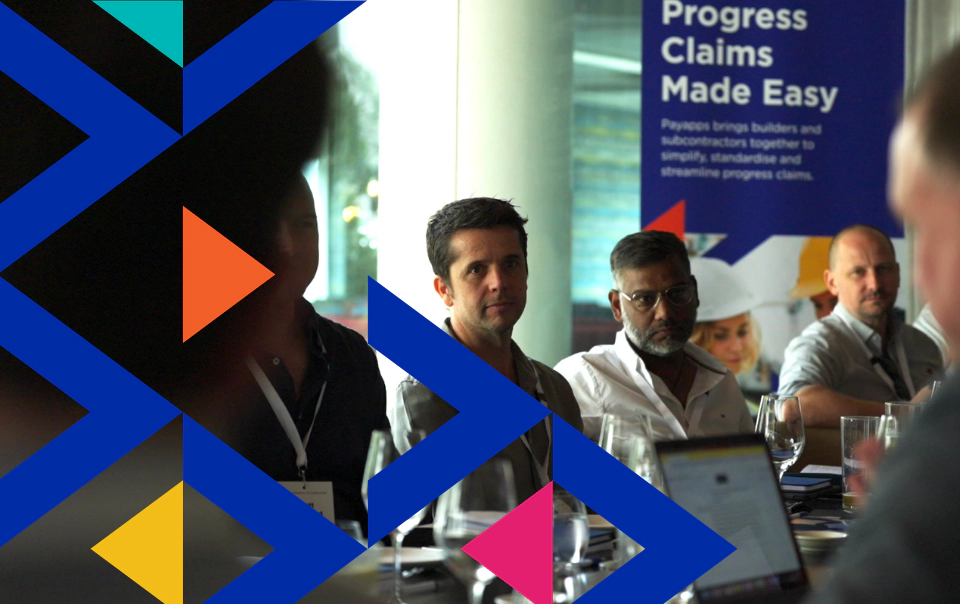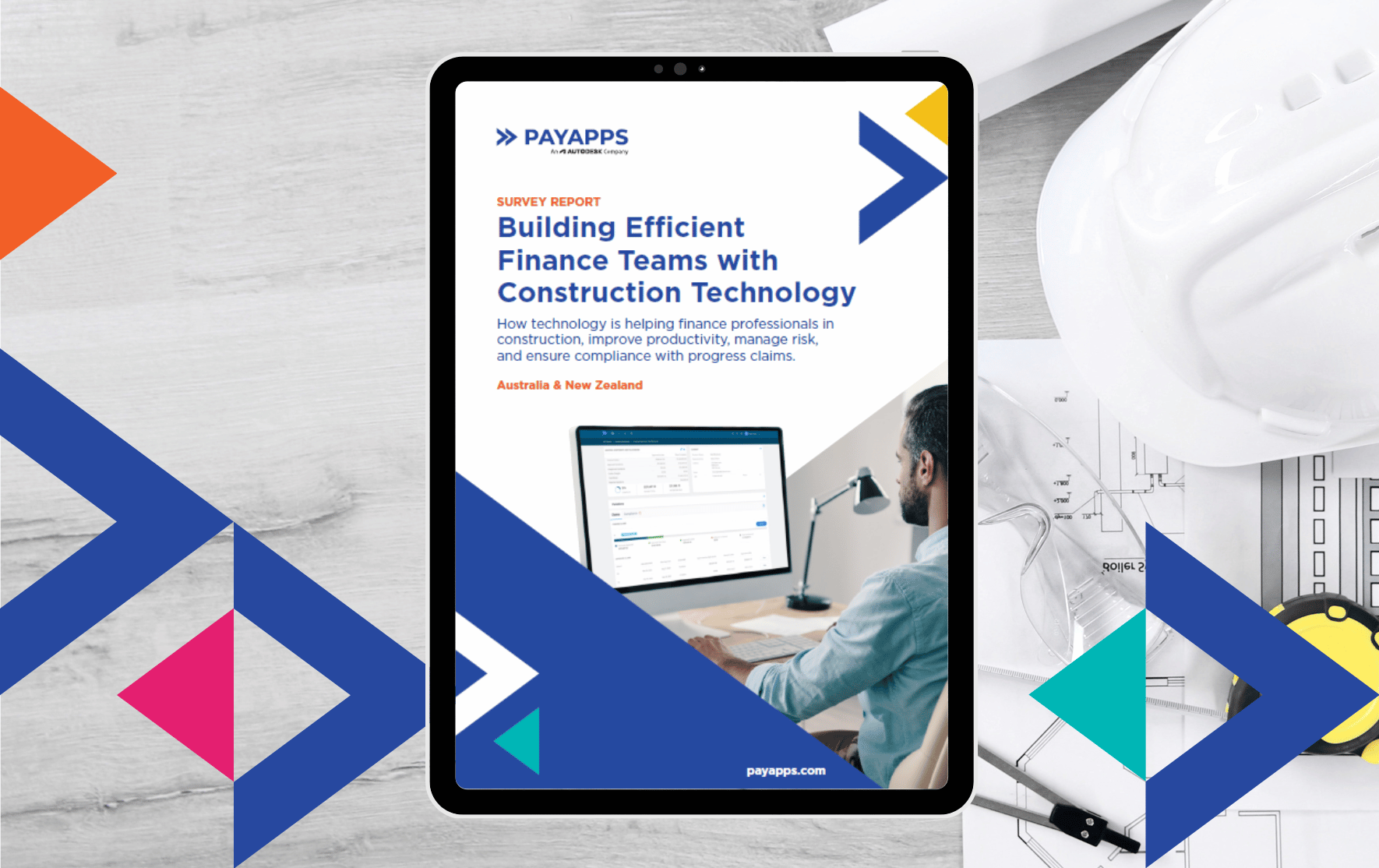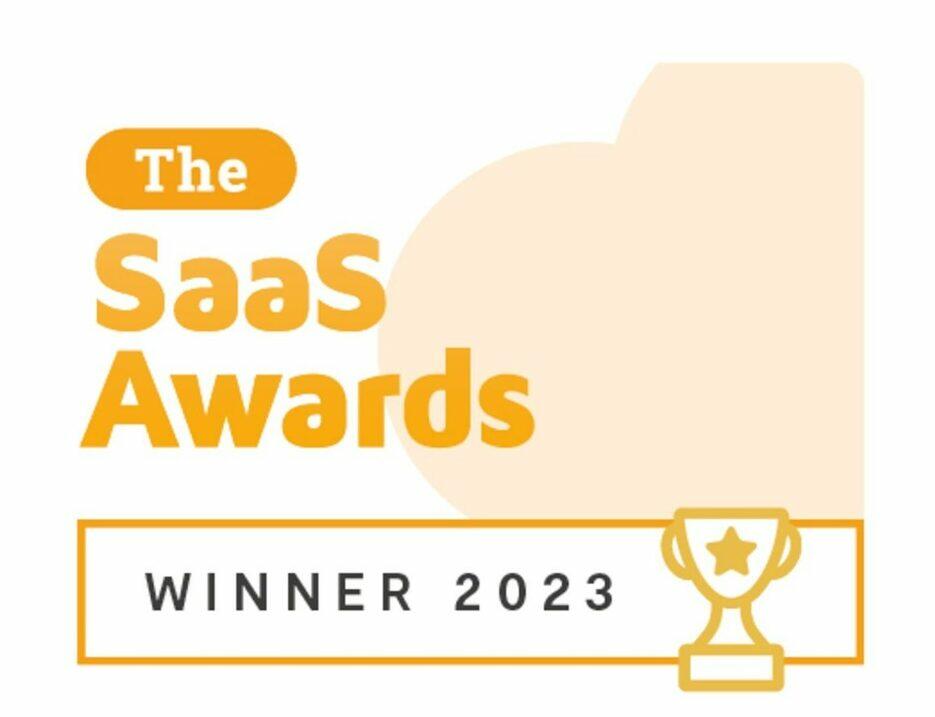In the rapidly evolving landscape of the Australian construction industry, many challenges confront businesses and professionals alike. The sector, faced with labour shortages, rising costs, and intensifying competition, seeks to navigate the complexities of an industry under pressure. Amidst these challenges lies the quest for resilience, a quality that could dictate the future trajectory of businesses within the sector
In response, construction leaders and senior professionals came together in Brisbane and Melbourne as part of Payapps “Building Resilience in Construction” roundtable series. The roundtables were moderated by Jordan Skinner, host of Australia’s #1 Construction Podcast series, “Crushing it in Construction” Podcast. Central to the discussions was sharing insights and best practices on how their businesses manage disruptions and how digital adoption can help build resilience in the construction industry.
The cornerstone of these sessions was Payapps, ‘Resilience In Construction Research Report” for 2023. Based on a global survey conducted by ACA Research, this report included feedback from 500 financial decision-makers across commercial construction companies in Australia, Ireland, New Zealand, and the UK. It provided a comprehensive look at the health status of businesses in the construction sector, focusing on four pivotal pillars: finances, stakeholder management, operations and processes, and employee engagement.
Resilience is not just about bouncing back—it’s about bouncing forward. It’s about learning from setbacks, adapting to new circumstances, and thriving in the face of challenges.
Roundtable Attendee
Navigating the Industry’s Toughest Headwinds
COVID-19 Disruptions
Unsurprisingly, the global COVID-19 pandemic stood out in the roundtable discussions as a dominant disruptor, reshaping the operational contours of the construction industry. Participants shed light on the profound ramifications of the pandemic, from altering project timelines to straining supply chains and escalating costs. With an industry-wide focus on adapting to fresh health and safety protocols, professionals are now ardently working to alleviate the disruptions instigated by the pandemic.
Skilled Labour Shortage: A Major Concern
The roundtables spotlighted another significant concern—the continuous shortfall of skilled labour. The roundtables revealed the industry’s struggle to attract and retain talent, particularly among the younger generation. Emerging workers’ changing expectations and required skill sets present a unique challenge for construction firms. The ongoing labour shortage complicates project schedules and intensifies competition among companies to secure skilled workers.
Supply Chain Concerns – Balancing Profitability Amidst Rising Costs
Roundtable participants vocalised pressing apprehensions about supply chain intricacies. They highlighted the challenges in procuring essential construction materials and equipment, attributing these disruptions to global supply chain glitches, prolonged shipping timelines, and surging costs. In this tumultuous period of inflation, heightened demand, and supply chain hiccups, construction firms are recalibrating their project feasibility and profit models, ensuring they remain buoyant amidst these fluctuations.
Government’s Lack of Collaboration and Consideration of Industry Capacity
Several attendees voiced concerns about the challenges governments have inadvertently brought to the industry. Many highlighted the burdensome regulatory requirements and bureaucracy that often slow project timelines and increase costs. They emphasised the need for streamlined processes and less red tape to foster a more efficient and competitive construction sector. Furthermore, participants expressed frustration over inconsistent government policies and their impact on business continuity. Attendees also raised concerns about governments announcing large-scale infrastructure projects to help stimulate the economy without considering if the industry can deliver. Instead, participants called for more vital collaboration between the industry and government to develop effective policies that support growth and address the specific needs of the construction sector. Such cooperation would help ensure successful project delivery, avoid overburdening the industry, and foster a sustainable construction environment.

Operationalising Resilience: Strategies in Action
The roundtables shed light on the various perspectives of resilience and its significance in navigating construction businesses’ challenges. Intending to foster a strong and sustainable construction industry, the participants emphasised the importance of adapting well to stress, bouncing back from setbacks, and maintaining mental health in adversity.
As defined by one attendee, resilience goes beyond merely bouncing back from challenges. It involves the ability to withstand, recover, and grow in the face of stressors and changing demands. This dynamic nature of resilience is particularly relevant in the construction industry, where uncertainties and pressures are commonplace. Participants stressed the need to handle these challenges gracefully and composure, continuously learning from setbacks and adapting to new circumstances.
In our industry, resilience means navigating through tough times, maintaining a positive mindset, and seeking support when needed. It’s about not letting setbacks define us but using them as stepping stones for growth.
Roundtable Attendee
While strategies to build greater resilience in their businesses varied among participants, five distinct themes emerged throughout the discussions.
1. Embrace a Culture of Continuous Learning
During the discussion, the importance of embracing a culture of continuous learning within the construction sector was emphasised by several participants. They highlighted the need for workers to actively seek out opportunities for professional development and for employers to provide the necessary resources and support to make this possible.
Attendees stressed the value of fostering a mindset of adaptability and emphasised the need to provide ongoing training that equips workers with the necessary skills to navigate challenges effectively. They noted that this is especially critical in a rapidly evolving construction industry where new construction technologies and processes are constantly being introduced. By prioritising continuous learning and training, workers can stay up-to-date with industry developments and remain competitive in an ever-changing job market.
Investing in our employees’ skills and growth is essential in building a resilient workforce and future-proofing our business.
Roundtable Attendee
2. Implementing strong financial and risk management strategies
Attendees acknowledged the crucial role of strong financials and emphasised the need for accurate financial planning, cost control, and responsible debt management.
Payapps Resilience In Construction Research Report revealed that a staggering 27% of construction companies admitted to being heavily impacted by late payments. However, digitally advanced firms showcased a remarkable edge in cash flow management. Only 11% of these tech-savvy entities reported cash flow struggles, with a whopping 47% boasting top-tier cash flow management capabilities.
Attendees emphasised the significance of proactive financial forecasting using technology, like Payapps, to effectively calculate and manage construction retentions for projects and establish strong relationships with financiers and banks to navigate potential challenges. Adaptability was a recurring theme, with participants highlighting the importance of adjusting financial practices to align with the evolving industry landscape.
Construction businesses should also identify potential risks and develop proactive mitigation strategies. This includes having contingency plans in place, adopting a diverse suite of technological solutions to streamline processes, and staying updated on industry trends to anticipate future challenges.
By adopting robust financial planning methods and effectively managing risk, we can confidently navigate uncertainties and avoid financial setbacks that can cripple construction projects.
Roundtable Attendee
3. Fostering Collaboration and Trust
In the construction industry, fostering collaboration and trust plays a pivotal role in the success of projects. Participants in the discussion highlighted the significance of cultivating trust and collaboration with clients, subcontractors, suppliers, and industry peers. Emphasis was placed on effective communication channels between teams, stakeholders, and clients to foster productive relationships.
One key strategy mentioned was the emphasis on open dialogue and regular feedback. By encouraging all parties involved to express their thoughts and concerns openly, misunderstandings can be avoided, and potential issues can be addressed proactively.
Establishing a culture of open communication facilitates effective problem-solving and ensures that everyone is aligned and informed throughout the project lifecycle.
Attendees also shared strategies to foster collaboration, such as understanding and meeting client expectations. Trust and confidence are built by actively listening to client’s needs and delivering on their requirements, creating a solid foundation for successful collaboration. Additionally, participants highlighted using technology, such as Payapps, to maintain transparency in project delivery. Digital tools allow stakeholders to easily track progress, manage documentation, and facilitate smooth communication.
Furthermore, establishing reputations for reliability and professionalism was crucial to fostering collaboration and trust in the construction industry. Building a track record of delivering projects on time and within budget while maintaining high-quality standards instils confidence in clients and partners alike. Reliable performance builds trust and strengthens relationships, leading to increased opportunities for collaboration in future endeavours.
Positive relationships can lead to repeat projects, referrals, and a positive reputation, ultimately enhancing a company’s ability to weather challenges and secure future opportunities.
Roundtable Attendee
4. Highly Efficient Processes: Driving Productivity and Minimising Disruptions
Efficiency is widely recognised as a critical factor for resilient construction businesses, and participants in the discussion highlighted the importance of embracing technology, streamlining workflows, and adopting innovative practices to drive productivity and minimise disruptions. Their experiences demonstrated the benefits of leveraging digitisation, automation, and lean construction principles to enhance efficiency.
A key theme from the discussions was the focus on continuous improvement and collaboration. Participants emphasised the importance of regularly evaluating processes to identify and resolve bottlenecks. By encouraging open dialogue and collaboration among team members, construction businesses can capitalise on collective knowledge and find innovative solutions to improve efficiency and productivity. This collaborative approach fosters a culture of continuous improvement, where all stakeholders are committed to optimising processes and driving efficiency.
Embracing digital solutions was seen as a crucial aspect of highly efficient processes. Project management software, mobile apps, and cloud-based platforms are examples of digital tools that can streamline construction processes. These technologies enhance efficiency by improving project visibility, facilitating real-time communication, and reducing administrative burden. By adopting these digital solutions, teams can focus more on problem-solving and adapting to changing circumstances rather than being bogged down by manual paperwork.
Furthermore, participants emphasised the importance of adopting lean construction principles. Lean construction principles revolve around maximising value while minimising waste. Construction businesses can streamline workflows and drive efficiency by eliminating unnecessary activities, reducing rework, and optimising resource allocation. This approach requires a mindset shift towards continuous improvement and a commitment to identifying and addressing inefficiencies at every project stage.
We found that manual processes resulted in errors and inconsistencies, ultimately affecting project timelines and client satisfaction. “Automation technology, like Payapps, has been a game-changer for us. It has allowed us to automate repetitive tasks, reduce errors, and improve overall project efficiency.
Roundtable Attendee
5. Resilience Through Technology Diversity
In the realm of construction, the digital evolution has ushered in a plethora of technological solutions, each with its distinct features and functionalities. As the industry’s challenges grow in complexity, so does the need for specialised tools tailored to address them.
The roundtable discussions illuminated this crucial intersection of resilience and technology diversity. Rather than placing all bets on a single technology, the participants highlighted the benefits of integrating a suite of specialised tools. When chosen for a specific purpose, each technology can create a resilient operational backbone that offers optimised solutions, improving efficiency and precision.
While an all-encompassing project management software might offer a broad perspective, a specialised progress payment claim management solution, designed with specific industry challenges in mind, can ensure financial resilience by streamlining cash flow, reducing payment disputes, and enhancing transparency between contractors and subcontractors throughout the progress payment claim process. On the other hand, general-purpose software might offer breadth. Still, the depth and nuance provided by niche tools ensure that specific tasks are executed with unmatched precision, reinforcing operational resilience.
Employing a single technology that attempts to be a jack of all trades is akin to relying on a single sub-contractor to fulfil all project requirements – it creates a dangerous dependency.
Roundtable Attendee
The insights and discussions from Payapps “Building Resilience in Construction” roundtable series encapsulate the Australian construction industry’s collective spirit. As the sector grapples with myriad challenges, from global disruptions to localised labour shortages, it’s evident that resilience is more than just a buzzword—it’s a fundamental trait that will shape the industry’s future. Embracing digital transformation, fostering trust, and investing in continuous learning aren’t just strategies; they’re imperatives for companies seeking to stand tall in the face of adversity. As industry leaders continue to share, innovate, and adapt, the Australian construction sector is poised to bounce back and leap forward, pioneering a resilient and sustainable construction landscape for future generations.








